Gentle Reminders

The more we read and learn, the higher quality of life we can provide for our precious equine companions. Whether you are new to the horse industry or a long-time equine owner, here are some gentle reminders on a few necessary aspects of horse care.
Be sure to have your horses vaccinated regularly. Speak with your vet about which inoculations he or she recommends for horses in your area of the country. Depending on your climate, how many horses you have, the rate of turnover in your barn, etc.; you could be advised to give vaccinations at different times during the year.
Be sure to have your horses on a good worming program. Wormers come in a variety of forms and contain different active ingredients. It's a good idea to rotate wormers, based on their active ingredients, throughout the year. Consult with your veterinarian and develop a schedule you can stick to. Some wormers can be used every 6-8 weeks, and if you do this along with your farrier schedule, you'll never forget!
Don't forget the dentist! Just as people need to have their teeth checked, horses do, too. Because of the way horses chew, their teeth wear and small hooks can form. If your horse has trouble accepting the bit or throws grain, you may need to have his teeth floated. Your vet should be able to recommend an equine dentist who can check your horse's teeth.
There's a popular saying about hoof care and it's, "No foot, no horse." Whether you choose to shoe your horse or not, regular trims and hoof maintenance are essential elements of horse care. Without good feet, your horse will not be in good health. Keep a regular schedule with your farrier, every 6-8 weeks, and you'll help keep your horse's feet in healthy condition.
Ventilation, ventilation, ventilation! By nature, horses are grazing animals meant to live outdoors. Make sure you have adequate ventilation in your barn and stalls. Well-ventilated air helps keep your horse's lungs healthy and helps prevent heaves and other respiratory infections.
Empty and scrub water buckets, troughs and feeders on a regular basis. Consider using a scrub brush and a diluted solution of bleach, but don't forget to rinse thoroughly.
Check hay thoroughly to make sure it is dry and free of mold. Not all hay is the same, and not all hay is suitable for horses. Options range from alfalfa and Timothy, to grass hay and other mixes. Be sure the protein content of your hay fits into the overall diet of your horse.
If your horses are stalled, keep the area clean, level and as dry as possible. Uneven ground can be hard on your horse's legs and back. Try filling in holes, leveling the ground and covering with stall mats. Mats provide cushion and make it easier for you to clean out the stall. Make sure you use enough bedding to absorb wet spots and remove the dirty bedding daily. When horses stand in damp areas, this can lead to thrush, an infection of the frog in your horse's foot.
Evaluate your feeding program to make sure your hay and grain are offering the right combination of protein. Some owners use different combinations during the winter and summer, and others vary their feeding regimen during show season and off-times.
We all want to keep our horses as healthy and happy as possible, and these are just a few ways to help. If you have questions, or are unsure about the best programs for your horse, talk with your veterinarian. We owe it to our horses to never stop learning about the best ways to care for them. The joy and companionship they provide in return makes it well worth our effort.
 Debbie has over 45 years experience with horses and equine-related businesses. She has owned, trained, boarded horses and run stables at various times in her career. She is a certified fence installer, has given balanced riding lessons, and has shown horses in Western, Western Pleasure, Trail, English, Hunter/Jumper, Fox Hunting, Hunter Trials, Dressage and driving classes. Debbie has been involved in foaling, and just about every aspect of horse ownership possible, and she welcomes your questions and comments. If you are interested in using any articles by Debbie, please send her and email.
Debbie has over 45 years experience with horses and equine-related businesses. She has owned, trained, boarded horses and run stables at various times in her career. She is a certified fence installer, has given balanced riding lessons, and has shown horses in Western, Western Pleasure, Trail, English, Hunter/Jumper, Fox Hunting, Hunter Trials, Dressage and driving classes. Debbie has been involved in foaling, and just about every aspect of horse ownership possible, and she welcomes your questions and comments. If you are interested in using any articles by Debbie, please send her and email.
RAMM Fence Systems, Inc. makes every effort to provide reliable and useful information on horse health, care and products. The statements made on this website are based on years of experience with horses, however, they are based on generalized situations and should not replace diagnosis or treatment by a veterinarian or consultation by a professional. RAMM Fence Systems, Inc. does not assume any legal responsibility. Readers should always consult qualified health care providers for specific diagnosis and treatment.
